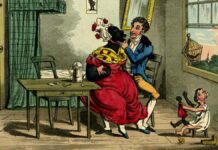Melodrama is a dramatic genre characterised by its emphasis on sensationalism and emotional manipulation. It often employs stock characters and dramatic plotlines to appeal to the audience’s emotions. Popular in theatre, film, and even literature, melodrama thrives on presenting characters and situations in a larger-than-life way.
The term “melodrama” comes from the Greek words “melos” (music) and “drama” (action). Initially, it referred to a dramatic work accompanied by music. The genre evolved during the late 18th century, particularly in France and England, where it became associated with plays featuring music, exaggerated emotions, and clear moral distinctions. Melodrama flourished during the 19th century, particularly in the Victorian era. It was a popular form of entertainment for the masses, often performed in large theatres and appealing to a broad audience.
Exaggerated Characters and Emotions
Melodramas are known for their exaggerated emotions and heightened sentimentality. Characters express their feelings in an intensified, almost hyperbolic manner, often accompanied by grandiose gestures and impassioned speeches. The aim is to evoke strong emotional responses from the audience, such as sympathy, pity, or righteous indignation.
Moral Polarisation
Melodramas often present a simplified moral universe, dividing characters into good and evil, virtue and vice. The protagonists are typically noble, virtuous, and innocent, while the antagonists are villainous, corrupt, and malevolent. This moral polarisation creates a clear sense of right and wrong, leaving little room for ambiguity or moral complexity. Good is rewarded, and evil is punished, often in very direct ways.
Sensational Plots and Dramatic Twists
The plots of melodramas are often sensational and filled with dramatic twists, surprises, and coincidences. These plays frequently feature secret identities, hidden relationships, unexpected revelations, and last-minute rescues. The aim is to keep the audience engaged and on the edge of their seats, eagerly anticipating the subsequent thrilling development.
Music and Spectacle
Melodramas often incorporate music and visual spectacle to heighten the emotional impact and create a more immersive experience for the audience. The term “melodrama” itself suggests using music to accompany and accentuate the dramatic action. Elaborate stage sets, striking visual effects, and evocative musical scores are standard features of melodramatic productions.
Stereotypical Characters
Melodramas often rely on stereotypical characters that embody specific virtues or vices. These stock characters include the noble hero, the innocent heroine, the dastardly villain, the comic relief, and the faithful servant. While lacking in psychological depth, these characters are archetypes the audience can easily recognise and identify with.
Triumph of Virtue and Poetic Justice
Melodramas typically conclude with the triumph of virtue over vice and the restoration of moral order. The virtuous characters are rewarded, while the villains are punished or brought to justice. This satisfying resolution, often referred to as poetic justice, reinforces the play’s moral message and leaves the audience with a sense of catharsis and moral affirmation.
Notable playwrights of the melodramatic genre include Dion Boucicault, Douglas William Jerrold, and Edward Fitzball. Some famous examples of melodramas are The Octoroon by Boucicault, Black-Eyed Susan by Jerrold, and Under the Gaslight by Augustin Daly.
Melodrama was immensely popular throughout the 19th century, appealing to a wide range of audiences across social classes. The genre’s emphasis on strong emotions, clear moral messages, and thrilling entertainment made it accessible and engaging for the masses. However, melodrama was criticised for lacking realism, artistic merit, and psychological depth. As theatrical tastes and styles evolved in the 20th century, melodrama gradually lost dominance. However, its influence can still be seen in various forms of popular entertainment, such as soap operas, romantic novels, and blockbuster films.






























